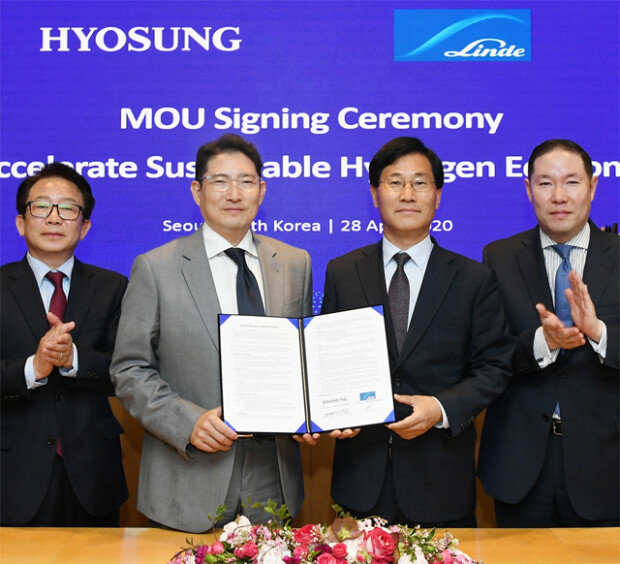Hyosung to build the world’s largest liquid hydrogen plant in Ulsan
Hyosung to build the world’s largest liquid hydrogen plant in Ulsan
Posted April. 29, 2020 07:33,
Updated April. 29, 2020 07:33

Hyosung Group has announced its plan to build the world’s largest liquid hydrogen plant. Following the one-trillion-won investment it made last year in a carbon fiber plant, the South Korean conglomerate will invest 300 billion won to accelerate the growth of the hydrogen economy. Carbon fiber is a core material in a hydrogen tank, and liquid hydrogen is fuel for a hydrogen car.
Hyosung Group has signed an agreement with Linde Group, a leading global provider of industrial gases, to invest 300 billion won in building a 30,000-square-mile liquid hydrogen plant with an annual capacity of 13,000 tons, which is enough to charge 100,000 hydrogen vehicles. The plant, which will be built at Hyosung Chemical’s Yongyeon plant in Ulsan, will be the largest single plant in the world. The two companies will set up a joint venture by the end of this year and start the construction in the first quarter of next year and finish it by 2022.
The new facility will use by-product hydrogen that comes from the Yongyeon plant to produce liquid hydrogen using Linde Group’s equipment and technology. The German chemical corporation is known for its technology that converts high pressure hydrogen gas into liquid hydrogen. The converted liquid hydrogen will be used for drones, ships, forklifts and other vehicles.
It is expected that, once built, the new facility would facilitate the growth of the South Korean market for hydrogen cars by increasing the supply of liquid hydrogen. It will also reduce costs for storage and transportation as hydrogen gas, which is currently the only form of hydrogen used in South Korea, takes up 800 times more space than liquid hydrogen. In addition, liquid hydrogen is safer than hydrogen gas with high pressure. It also takes only three minutes to charge with liquid hydrogen as opposed to 12 minutes with hydrogen gas, which will improve the efficiency of charging stations. As the charging time drops, the market for large hydrogen vehicles such as trucks that require large hydrogen fuel cells is expected to grow.
Hyosung Group and Linde Group will work together to produce and transport liquid hydrogen and install and operate charging stations. They will also build infrastructure together by building 50 hydrogen charging stations in major cities across the country and adding liquid hydrogen charging equipment to 70 existing stations.
Dong-Jun Heo hungry@donga.com







